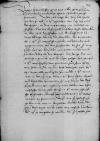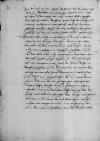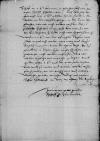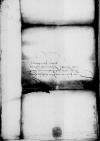Wie wir negst den XIII dits monts ins kurtze uff E(wer) E(rbarkei)t cf. Gdańsk Town Council to Ioannes DANTISCUS Gdańsk (Danzig), 1544-03-09, CIDTC IDL 4580⌊schreibencf. Gdańsk Town Council to Ioannes DANTISCUS Gdańsk (Danzig), 1544-03-09, CIDTC IDL 4580⌋, / den IX tag auch des itzigen / an uns ausgangen, / im cf. Ioannes DANTISCUS to Gdańsk Town Council Heilsberg (Lidzbark Warmiński), 1544-03-13, CIDTC IDL 4433⌊antwortcf. Ioannes DANTISCUS to Gdańsk Town Council Heilsberg (Lidzbark Warmiński), 1544-03-13, CIDTC IDL 4433⌋ angezeigt, / das uns dazumall so eilent unser bedencken / in dem, was die schiffart mit der fracht und ladung belangt, / der sich die frembden / den einwonern bei E(wer) E(rbarkei)t zu merglichem schaden understanden und angenommen, / von uns zuschreiben / die zeit zu enge fielh, / hab wir der sieder mit gueter muess unnd sonderm vleis bei uns bewogen / das jenige, das aus statlichem grunde / und der sachen gelegenheit gemess / E(wer) E(rbarkei)t vorsichtiglich, / dem gemeinen gute zum besten, / uns haben lassen wissen, / dobei uberlesen, / wie Sigismund I Jagiellon (Zygmunt I) (*1467 – †1548), King of Poland and Grand Duke of Lithuania (1506-1548); Duke of Głogów (Glogau) (1499-1506), Duke of Opava (1501-1506), Governor of Silesia (1504-1506); son of King Kazimierz IV Jagiellon and Elisabeth of Austria⌊ko(niglich)e m(aieste)tSigismund I Jagiellon (Zygmunt I) (*1467 – †1548), King of Poland and Grand Duke of Lithuania (1506-1548); Duke of Głogów (Glogau) (1499-1506), Duke of Opava (1501-1506), Governor of Silesia (1504-1506); son of King Kazimierz IV Jagiellon and Elisabeth of Austria⌋, unser aller gnedigster her, / widder E(wer) E(rbarkei)t vornemen / in der satzunge / lauts E(wer) E(rbarkei)t privilegien, / der Gdańsk (Danzig, Dantiscum), city in northern Poland, on the Bay of Gdańsk at the mouth of the Vistula, on the Baltic, the biggest and wealthiest of the three Great Prussian Cities (Gdańsk, Thorn (Toruń), and Elbing (Elbląg)) with representation in the Council of Royal Prussia; a member of the Hanseatic League⌊stadtGdańsk (Danzig, Dantiscum), city in northern Poland, on the Bay of Gdańsk at the mouth of the Vistula, on the Baltic, the biggest and wealthiest of the three Great Prussian Cities (Gdańsk, Thorn (Toruń), and Elbing (Elbląg)) with representation in the Council of Royal Prussia; a member of the Hanseatic League⌋ und derselbten Citizens of Gdańsk ⌊einwonernCitizens of Gdańsk ⌋ zu nutz, / dovon der sehe farende man sein nahrung mus haben, / von eigen nutzlichen leuten ubel bericht / E(wer) E(rbarkei)t etwan scharff het beschrieben, / doruff Euch widderumb E(wer) E(rbarkei)t billich antwort eingenommen, / dorzu uns zu gedechtnis ist kommen, / was in demselbten handel durch die hern Council of Royal Prussia the most important local authority in Royal Prussia. It consisted of two bishops (of Ermland (Warmia), who served as the Council’s president, and of Kulm (Chełmno)), three voivodes (of Kulm, Marienburg (Malbork), and Pomerania), three castellans (of Kulm, Elbing (Elbląg), and Gdańsk (Danzig)), three chamberlains (of Kulm, Marienburg, and Pomerania), and representatives of the three Great Prussian Cities – Gdańsk, Thorn (Toruń), and Elbing (ACHREMCZYK 2016, p. 17-18)⌊rethe dieser landeCouncil of Royal Prussia the most important local authority in Royal Prussia. It consisted of two bishops (of Ermland (Warmia), who served as the Council’s president, and of Kulm (Chełmno)), three voivodes (of Kulm, Marienburg (Malbork), and Pomerania), three castellans (of Kulm, Elbing (Elbląg), and Gdańsk (Danzig)), three chamberlains (of Kulm, Marienburg, and Pomerania), and representatives of the three Great Prussian Cities – Gdańsk, Thorn (Toruń), and Elbing (ACHREMCZYK 2016, p. 17-18)⌋ / neben uns negst zu Cracow (Kraków, Cracovia), city in southern Poland, Małopolska, on the Vistula river, from 1038 capital of the Kingdom of Poland⌊CrockawCracow (Kraków, Cracovia), city in southern Poland, Małopolska, on the Vistula river, from 1038 capital of the Kingdom of Poland⌋ / ko(nigliche)r m(aieste)t ist vorgebracht worden, / den zur selben zeit  APG 300, 53, 269, p. 20 ire ko(niglich)e m(aieste)t uf em negsten Diet of Poland ⌊reichstagDiet of Poland ⌋, / der kurtzlich diese tage zu Piotrków (Petricovia), city in central Poland, in the 15th-16th century the location of the assemblies of the Diet (Sejm) of the Kingdom of Poland, today Piotrków Trybunalski⌊PeterkawPiotrków (Petricovia), city in central Poland, in the 15th-16th century the location of the assemblies of the Diet (Sejm) of the Kingdom of Poland, today Piotrków Trybunalski⌋ sein endtschaft genommen, / thet vorlegen, / derwegen wir nicht ungern hetten gesehen, / das uff gemeltem reichstag / diese sache der fracht und ladung / widderumb wer gedacht / und uf die bane gebracht worden, / dorzu wir uns williglich, / der guten stad zu fordernis, / wolten haben lassen gebrauchen. / Dieweil aber solchs vorblieben / und dennoch in keinen weg sich wil fuegen, / das thun, / doran nicht allein der Gdańsk (Danzig, Dantiscum), city in northern Poland, on the Bay of Gdańsk at the mouth of the Vistula, on the Baltic, the biggest and wealthiest of the three Great Prussian Cities (Gdańsk, Thorn (Toruń), and Elbing (Elbląg)) with representation in the Council of Royal Prussia; a member of the Hanseatic League⌊stadtGdańsk (Danzig, Dantiscum), city in northern Poland, on the Bay of Gdańsk at the mouth of the Vistula, on the Baltic, the biggest and wealthiest of the three Great Prussian Cities (Gdańsk, Thorn (Toruń), and Elbing (Elbląg)) with representation in the Council of Royal Prussia; a member of the Hanseatic League⌋, / sondern auch der Poland (Kingdom of Poland, Polonia)⌊CronPoland (Kingdom of Poland, Polonia)⌋ / und Royal Prussia (Prussia Regalis), region, part of Prussia annexed to the Kingdom of Poland in 1466 under the provisions of the Second Peace of Thorn⌊diesem landeRoyal Prussia (Prussia Regalis), region, part of Prussia annexed to the Kingdom of Poland in 1466 under the provisions of the Second Peace of Thorn⌋ nicht wenig gelegen, / in vorgessen zustellen, / lasse wir uns beduncken nicht ungerathen, / das dieser handell uff negstkunftiger Provincial Diet of Royal Prussia ⌊tagfartProvincial Diet of Royal Prussia ⌋ zu Marienburg (Malbork), town and castle in northern Poland, Pomeranian Voivodeship, on the Nogat river, a branch of the Vistula at its delta, the capital of the Grand Masters of the Teutonic Order in Prussia (1309-1457), a voivodeship capital in Royal Prussia, which belonged to the Kingdom of Poland (1466-1772). Marienburg (taking turns with Graudenz (Grudziądz)) was the venue for the Provincial Diets of Royal Prussia, which were chaired by the bishop of Ermland (Warmia)⌊MarienburgkMarienburg (Malbork), town and castle in northern Poland, Pomeranian Voivodeship, on the Nogat river, a branch of the Vistula at its delta, the capital of the Grand Masters of the Teutonic Order in Prussia (1309-1457), a voivodeship capital in Royal Prussia, which belonged to the Kingdom of Poland (1466-1772). Marienburg (taking turns with Graudenz (Grudziądz)) was the venue for the Provincial Diets of Royal Prussia, which were chaired by the bishop of Ermland (Warmia)⌋ ufs new vorgenommen / und den herren Council of Royal Prussia the most important local authority in Royal Prussia. It consisted of two bishops (of Ermland (Warmia), who served as the Council’s president, and of Kulm (Chełmno)), three voivodes (of Kulm, Marienburg (Malbork), and Pomerania), three castellans (of Kulm, Elbing (Elbląg), and Gdańsk (Danzig)), three chamberlains (of Kulm, Marienburg, and Pomerania), and representatives of the three Great Prussian Cities – Gdańsk, Thorn (Toruń), and Elbing (ACHREMCZYK 2016, p. 17-18)⌊rethenCouncil of Royal Prussia the most important local authority in Royal Prussia. It consisted of two bishops (of Ermland (Warmia), who served as the Council’s president, and of Kulm (Chełmno)), three voivodes (of Kulm, Marienburg (Malbork), and Pomerania), three castellans (of Kulm, Elbing (Elbląg), and Gdańsk (Danzig)), three chamberlains (of Kulm, Marienburg, and Pomerania), and representatives of the three Great Prussian Cities – Gdańsk, Thorn (Toruń), and Elbing (ACHREMCZYK 2016, p. 17-18)⌋ in ratschlag gegeben wurde, / nemlich wie wir vorstanden, etliche vornembste herren, geistlich und weltlich, der Poland (Kingdom of Poland, Polonia)⌊CronPoland (Kingdom of Poland, Polonia)⌋ dohin von hochgedachter Sigismund I Jagiellon (Zygmunt I) (*1467 – †1548), King of Poland and Grand Duke of Lithuania (1506-1548); Duke of Głogów (Glogau) (1499-1506), Duke of Opava (1501-1506), Governor of Silesia (1504-1506); son of King Kazimierz IV Jagiellon and Elisabeth of Austria⌊ko(nigliche)r m(aieste)tSigismund I Jagiellon (Zygmunt I) (*1467 – †1548), King of Poland and Grand Duke of Lithuania (1506-1548); Duke of Głogów (Glogau) (1499-1506), Duke of Opava (1501-1506), Governor of Silesia (1504-1506); son of King Kazimierz IV Jagiellon and Elisabeth of Austria⌋ vorordennt seint, / das mit den, die gelegenheit allenthalben dieser sachen beredt / und sie belernet mochtenn werden, / aus was ursachen solche setzung uber die fracht und ladung / zwuschen dem burger und frembden / von E(wer) E(rbarkei)t lauts der stad privilegien / aufzurichten wer vorgenommen, / mit anzeigung, wie es in den orten und stedten, / von den die frembden
APG 300, 53, 269, p. 20 ire ko(niglich)e m(aieste)t uf em negsten Diet of Poland ⌊reichstagDiet of Poland ⌋, / der kurtzlich diese tage zu Piotrków (Petricovia), city in central Poland, in the 15th-16th century the location of the assemblies of the Diet (Sejm) of the Kingdom of Poland, today Piotrków Trybunalski⌊PeterkawPiotrków (Petricovia), city in central Poland, in the 15th-16th century the location of the assemblies of the Diet (Sejm) of the Kingdom of Poland, today Piotrków Trybunalski⌋ sein endtschaft genommen, / thet vorlegen, / derwegen wir nicht ungern hetten gesehen, / das uff gemeltem reichstag / diese sache der fracht und ladung / widderumb wer gedacht / und uf die bane gebracht worden, / dorzu wir uns williglich, / der guten stad zu fordernis, / wolten haben lassen gebrauchen. / Dieweil aber solchs vorblieben / und dennoch in keinen weg sich wil fuegen, / das thun, / doran nicht allein der Gdańsk (Danzig, Dantiscum), city in northern Poland, on the Bay of Gdańsk at the mouth of the Vistula, on the Baltic, the biggest and wealthiest of the three Great Prussian Cities (Gdańsk, Thorn (Toruń), and Elbing (Elbląg)) with representation in the Council of Royal Prussia; a member of the Hanseatic League⌊stadtGdańsk (Danzig, Dantiscum), city in northern Poland, on the Bay of Gdańsk at the mouth of the Vistula, on the Baltic, the biggest and wealthiest of the three Great Prussian Cities (Gdańsk, Thorn (Toruń), and Elbing (Elbląg)) with representation in the Council of Royal Prussia; a member of the Hanseatic League⌋, / sondern auch der Poland (Kingdom of Poland, Polonia)⌊CronPoland (Kingdom of Poland, Polonia)⌋ / und Royal Prussia (Prussia Regalis), region, part of Prussia annexed to the Kingdom of Poland in 1466 under the provisions of the Second Peace of Thorn⌊diesem landeRoyal Prussia (Prussia Regalis), region, part of Prussia annexed to the Kingdom of Poland in 1466 under the provisions of the Second Peace of Thorn⌋ nicht wenig gelegen, / in vorgessen zustellen, / lasse wir uns beduncken nicht ungerathen, / das dieser handell uff negstkunftiger Provincial Diet of Royal Prussia ⌊tagfartProvincial Diet of Royal Prussia ⌋ zu Marienburg (Malbork), town and castle in northern Poland, Pomeranian Voivodeship, on the Nogat river, a branch of the Vistula at its delta, the capital of the Grand Masters of the Teutonic Order in Prussia (1309-1457), a voivodeship capital in Royal Prussia, which belonged to the Kingdom of Poland (1466-1772). Marienburg (taking turns with Graudenz (Grudziądz)) was the venue for the Provincial Diets of Royal Prussia, which were chaired by the bishop of Ermland (Warmia)⌊MarienburgkMarienburg (Malbork), town and castle in northern Poland, Pomeranian Voivodeship, on the Nogat river, a branch of the Vistula at its delta, the capital of the Grand Masters of the Teutonic Order in Prussia (1309-1457), a voivodeship capital in Royal Prussia, which belonged to the Kingdom of Poland (1466-1772). Marienburg (taking turns with Graudenz (Grudziądz)) was the venue for the Provincial Diets of Royal Prussia, which were chaired by the bishop of Ermland (Warmia)⌋ ufs new vorgenommen / und den herren Council of Royal Prussia the most important local authority in Royal Prussia. It consisted of two bishops (of Ermland (Warmia), who served as the Council’s president, and of Kulm (Chełmno)), three voivodes (of Kulm, Marienburg (Malbork), and Pomerania), three castellans (of Kulm, Elbing (Elbląg), and Gdańsk (Danzig)), three chamberlains (of Kulm, Marienburg, and Pomerania), and representatives of the three Great Prussian Cities – Gdańsk, Thorn (Toruń), and Elbing (ACHREMCZYK 2016, p. 17-18)⌊rethenCouncil of Royal Prussia the most important local authority in Royal Prussia. It consisted of two bishops (of Ermland (Warmia), who served as the Council’s president, and of Kulm (Chełmno)), three voivodes (of Kulm, Marienburg (Malbork), and Pomerania), three castellans (of Kulm, Elbing (Elbląg), and Gdańsk (Danzig)), three chamberlains (of Kulm, Marienburg, and Pomerania), and representatives of the three Great Prussian Cities – Gdańsk, Thorn (Toruń), and Elbing (ACHREMCZYK 2016, p. 17-18)⌋ in ratschlag gegeben wurde, / nemlich wie wir vorstanden, etliche vornembste herren, geistlich und weltlich, der Poland (Kingdom of Poland, Polonia)⌊CronPoland (Kingdom of Poland, Polonia)⌋ dohin von hochgedachter Sigismund I Jagiellon (Zygmunt I) (*1467 – †1548), King of Poland and Grand Duke of Lithuania (1506-1548); Duke of Głogów (Glogau) (1499-1506), Duke of Opava (1501-1506), Governor of Silesia (1504-1506); son of King Kazimierz IV Jagiellon and Elisabeth of Austria⌊ko(nigliche)r m(aieste)tSigismund I Jagiellon (Zygmunt I) (*1467 – †1548), King of Poland and Grand Duke of Lithuania (1506-1548); Duke of Głogów (Glogau) (1499-1506), Duke of Opava (1501-1506), Governor of Silesia (1504-1506); son of King Kazimierz IV Jagiellon and Elisabeth of Austria⌋ vorordennt seint, / das mit den, die gelegenheit allenthalben dieser sachen beredt / und sie belernet mochtenn werden, / aus was ursachen solche setzung uber die fracht und ladung / zwuschen dem burger und frembden / von E(wer) E(rbarkei)t lauts der stad privilegien / aufzurichten wer vorgenommen, / mit anzeigung, wie es in den orten und stedten, / von den die frembden  APG 300, 53, 269, p. 21 schiffe an E(wer) E(rbarkei)t kommen, / in gleichem falh mit den unsern doselbst gehalten wirt. / Auch helt sich der gebrauch, wie E(wer) E(rbarkei)t melden, / hie im Royal Prussia (Prussia Regalis), region, part of Prussia annexed to the Kingdom of Poland in 1466 under the provisions of the Second Peace of Thorn⌊landeRoyal Prussia (Prussia Regalis), region, part of Prussia annexed to the Kingdom of Poland in 1466 under the provisions of the Second Peace of Thorn⌋ in den stedten, / an der Vistula (Wisła), river in Poland⌊WeissellVistula (Wisła), river in Poland⌋ gelegen, / in der Poland (Kingdom of Poland, Polonia)⌊CronPoland (Kingdom of Poland, Polonia)⌋ dergleichen, / wie wir nicht anders wissen, / das, so frembde fuhrleut in ein stadt kommen, / in vor den einwohnern zuladen nicht wirt zugelassenn / etc., worinne E(wer) E(rbarkei)t, / wan das uff negster Provincial Diet of Royal Prussia ⌊tagfartProvincial Diet of Royal Prussia ⌋ wirt sollen angebracht werden, / was nottig und dorzu dinstlich wirt sein, / domit die Council of Royal Prussia the most important local authority in Royal Prussia. It consisted of two bishops (of Ermland (Warmia), who served as the Council’s president, and of Kulm (Chełmno)), three voivodes (of Kulm, Marienburg (Malbork), and Pomerania), three castellans (of Kulm, Elbing (Elbląg), and Gdańsk (Danzig)), three chamberlains (of Kulm, Marienburg, and Pomerania), and representatives of the three Great Prussian Cities – Gdańsk, Thorn (Toruń), and Elbing (ACHREMCZYK 2016, p. 17-18)⌊herren retheCouncil of Royal Prussia the most important local authority in Royal Prussia. It consisted of two bishops (of Ermland (Warmia), who served as the Council’s president, and of Kulm (Chełmno)), three voivodes (of Kulm, Marienburg (Malbork), and Pomerania), three castellans (of Kulm, Elbing (Elbląg), and Gdańsk (Danzig)), three chamberlains (of Kulm, Marienburg, and Pomerania), and representatives of the three Great Prussian Cities – Gdańsk, Thorn (Toruń), and Elbing (ACHREMCZYK 2016, p. 17-18)⌋ Sigismund I Jagiellon (Zygmunt I) (*1467 – †1548), King of Poland and Grand Duke of Lithuania (1506-1548); Duke of Głogów (Glogau) (1499-1506), Duke of Opava (1501-1506), Governor of Silesia (1504-1506); son of King Kazimierz IV Jagiellon and Elisabeth of Austria⌊ko(niglich)e m(aieste)tSigismund I Jagiellon (Zygmunt I) (*1467 – †1548), King of Poland and Grand Duke of Lithuania (1506-1548); Duke of Głogów (Glogau) (1499-1506), Duke of Opava (1501-1506), Governor of Silesia (1504-1506); son of King Kazimierz IV Jagiellon and Elisabeth of Austria⌋ grundtlich in dieser sachen mugen berichten, / anzubrengen nicht werden nachlassen. / Was wir alsdan fuglichs und nutzlichs in diesem unnd andern felhen E(wer) E(rbarkei)t und der guten Gdańsk (Danzig, Dantiscum), city in northern Poland, on the Bay of Gdańsk at the mouth of the Vistula, on the Baltic, the biggest and wealthiest of the three Great Prussian Cities (Gdańsk, Thorn (Toruń), and Elbing (Elbląg)) with representation in the Council of Royal Prussia; a member of the Hanseatic League⌊stadtGdańsk (Danzig, Dantiscum), city in northern Poland, on the Bay of Gdańsk at the mouth of the Vistula, on the Baltic, the biggest and wealthiest of the three Great Prussian Cities (Gdańsk, Thorn (Toruń), and Elbing (Elbląg)) with representation in the Council of Royal Prussia; a member of the Hanseatic League⌋, / unserm vaterlandt, / zu willen und wolfart / werden wissen fortzustellen, / sein wir unbeschwert und erbottig. / Gotlichen gnaden bovolhen. /
APG 300, 53, 269, p. 21 schiffe an E(wer) E(rbarkei)t kommen, / in gleichem falh mit den unsern doselbst gehalten wirt. / Auch helt sich der gebrauch, wie E(wer) E(rbarkei)t melden, / hie im Royal Prussia (Prussia Regalis), region, part of Prussia annexed to the Kingdom of Poland in 1466 under the provisions of the Second Peace of Thorn⌊landeRoyal Prussia (Prussia Regalis), region, part of Prussia annexed to the Kingdom of Poland in 1466 under the provisions of the Second Peace of Thorn⌋ in den stedten, / an der Vistula (Wisła), river in Poland⌊WeissellVistula (Wisła), river in Poland⌋ gelegen, / in der Poland (Kingdom of Poland, Polonia)⌊CronPoland (Kingdom of Poland, Polonia)⌋ dergleichen, / wie wir nicht anders wissen, / das, so frembde fuhrleut in ein stadt kommen, / in vor den einwohnern zuladen nicht wirt zugelassenn / etc., worinne E(wer) E(rbarkei)t, / wan das uff negster Provincial Diet of Royal Prussia ⌊tagfartProvincial Diet of Royal Prussia ⌋ wirt sollen angebracht werden, / was nottig und dorzu dinstlich wirt sein, / domit die Council of Royal Prussia the most important local authority in Royal Prussia. It consisted of two bishops (of Ermland (Warmia), who served as the Council’s president, and of Kulm (Chełmno)), three voivodes (of Kulm, Marienburg (Malbork), and Pomerania), three castellans (of Kulm, Elbing (Elbląg), and Gdańsk (Danzig)), three chamberlains (of Kulm, Marienburg, and Pomerania), and representatives of the three Great Prussian Cities – Gdańsk, Thorn (Toruń), and Elbing (ACHREMCZYK 2016, p. 17-18)⌊herren retheCouncil of Royal Prussia the most important local authority in Royal Prussia. It consisted of two bishops (of Ermland (Warmia), who served as the Council’s president, and of Kulm (Chełmno)), three voivodes (of Kulm, Marienburg (Malbork), and Pomerania), three castellans (of Kulm, Elbing (Elbląg), and Gdańsk (Danzig)), three chamberlains (of Kulm, Marienburg, and Pomerania), and representatives of the three Great Prussian Cities – Gdańsk, Thorn (Toruń), and Elbing (ACHREMCZYK 2016, p. 17-18)⌋ Sigismund I Jagiellon (Zygmunt I) (*1467 – †1548), King of Poland and Grand Duke of Lithuania (1506-1548); Duke of Głogów (Glogau) (1499-1506), Duke of Opava (1501-1506), Governor of Silesia (1504-1506); son of King Kazimierz IV Jagiellon and Elisabeth of Austria⌊ko(niglich)e m(aieste)tSigismund I Jagiellon (Zygmunt I) (*1467 – †1548), King of Poland and Grand Duke of Lithuania (1506-1548); Duke of Głogów (Glogau) (1499-1506), Duke of Opava (1501-1506), Governor of Silesia (1504-1506); son of King Kazimierz IV Jagiellon and Elisabeth of Austria⌋ grundtlich in dieser sachen mugen berichten, / anzubrengen nicht werden nachlassen. / Was wir alsdan fuglichs und nutzlichs in diesem unnd andern felhen E(wer) E(rbarkei)t und der guten Gdańsk (Danzig, Dantiscum), city in northern Poland, on the Bay of Gdańsk at the mouth of the Vistula, on the Baltic, the biggest and wealthiest of the three Great Prussian Cities (Gdańsk, Thorn (Toruń), and Elbing (Elbląg)) with representation in the Council of Royal Prussia; a member of the Hanseatic League⌊stadtGdańsk (Danzig, Dantiscum), city in northern Poland, on the Bay of Gdańsk at the mouth of the Vistula, on the Baltic, the biggest and wealthiest of the three Great Prussian Cities (Gdańsk, Thorn (Toruń), and Elbing (Elbląg)) with representation in the Council of Royal Prussia; a member of the Hanseatic League⌋, / unserm vaterlandt, / zu willen und wolfart / werden wissen fortzustellen, / sein wir unbeschwert und erbottig. / Gotlichen gnaden bovolhen. /
 APG 300, 53, 269, p. 20 ire ko(niglich)e m(aieste)t uf em negsten
APG 300, 53, 269, p. 20 ire ko(niglich)e m(aieste)t uf em negsten  APG 300, 53, 269, p. 21 schiffe an E(wer) E(rbarkei)t kommen, / in gleichem falh mit den unsern doselbst gehalten wirt. / Auch helt sich der gebrauch, wie E(wer) E(rbarkei)t melden, / hie im
APG 300, 53, 269, p. 21 schiffe an E(wer) E(rbarkei)t kommen, / in gleichem falh mit den unsern doselbst gehalten wirt. / Auch helt sich der gebrauch, wie E(wer) E(rbarkei)t melden, / hie im 


